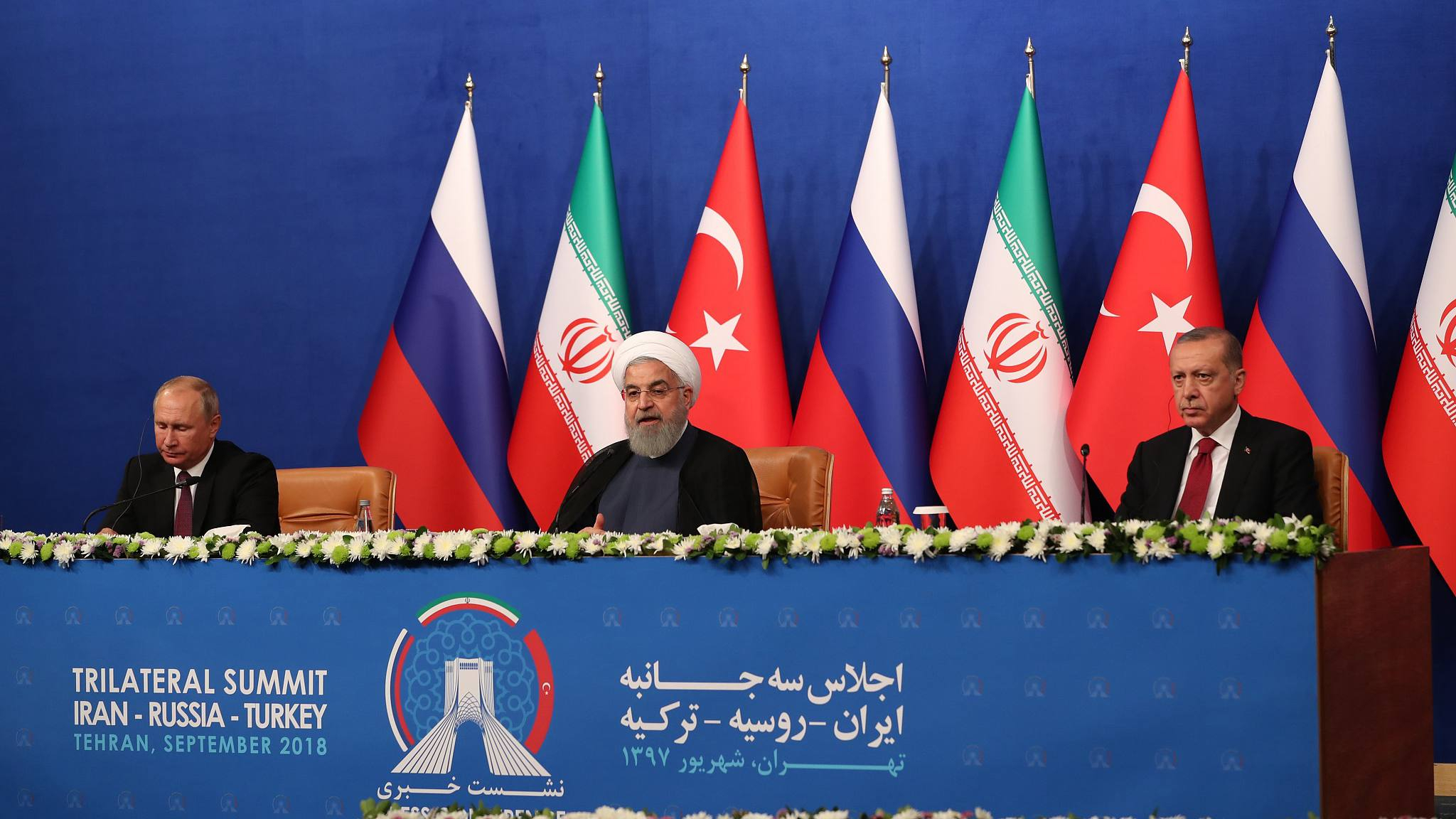The presidents of Turkey, Iran and Russia on Friday failed to agree on a ceasefire that would forestall a Syrian government offensive in the rebel-held Idlib province which the United Nations fears could cause a humanitarian catastrophe involving tens of thousands of civilians.
Key foreign players in the Syrian war - Turkey's Tayyip Erdogan, Russia's Vladimir Putin and Iran's Hassan Rouhani - agreed in a final statement that there could be no military solution to the conflict and it could only end through a negotiated political process.
The Assad government was not directly represented at the summit in Tehran.
As leaders were meeting to discuss a possible solution to end the Syria war, the Syrian government and Russian warplanes mounted air strikes in Idlib on Friday morning in a possible prelude to a full-scale offensive.
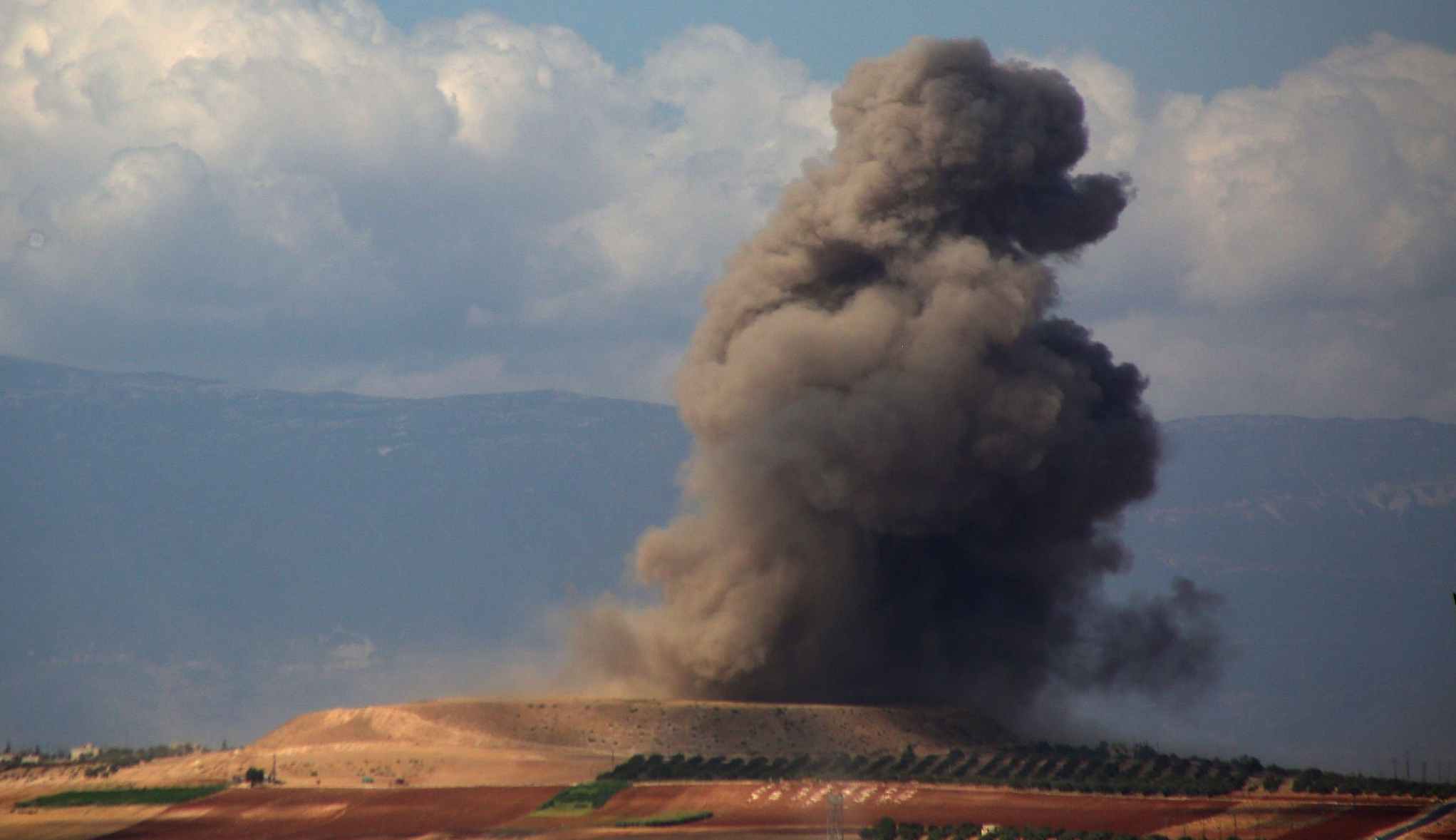
Smoke rises near the Syrian village of Kafr Ain in the northern Idlib province after an airstrike on Sept. 7, 2018. /VCG Photo
Smoke rises near the Syrian village of Kafr Ain in the northern Idlib province after an airstrike on Sept. 7, 2018. /VCG Photo
Idlib is the insurgents' only remaining major stronghold, and a government offensive could be the war's last decisive battle.
Their discussions in Tehran mark a crucial point in a seven-year-old war, which has killed more than half a million people and forced 11 million to flee their homes.
Turkey
The Turkish leader said he feared a massacre and Turkey could not accommodate any more refugees flooding over its border.
Turkey has accepted 3.5 million refugees from Syria since the start of the war in 2011.
"Whatever reason there is an attack that has been made or will be made will result in disaster, massacre and humanitarian drama," Erdogan said. "Millions will be coming to Turkey's borders because they have nowhere to go. Turkey has filled its capacity to host refugees."
Russia
Putin said a ceasefire would be pointless as it would not involve Islamist militant groups.
"But I can't speak for them (the armed opposition), and even more so can't talk for terrorists from Jabhat al-Nusra or ISIS (ISIL) that they will stop shooting or stop using drones with bombs," Putin said, responding to Erdogan's call for a ceasefire.
Iran
Rouhani said the battle in Syria would continue until rebels were pushed out of the whole country, especially in Idlib, but he added that any military operations should avoid hurting civilians.
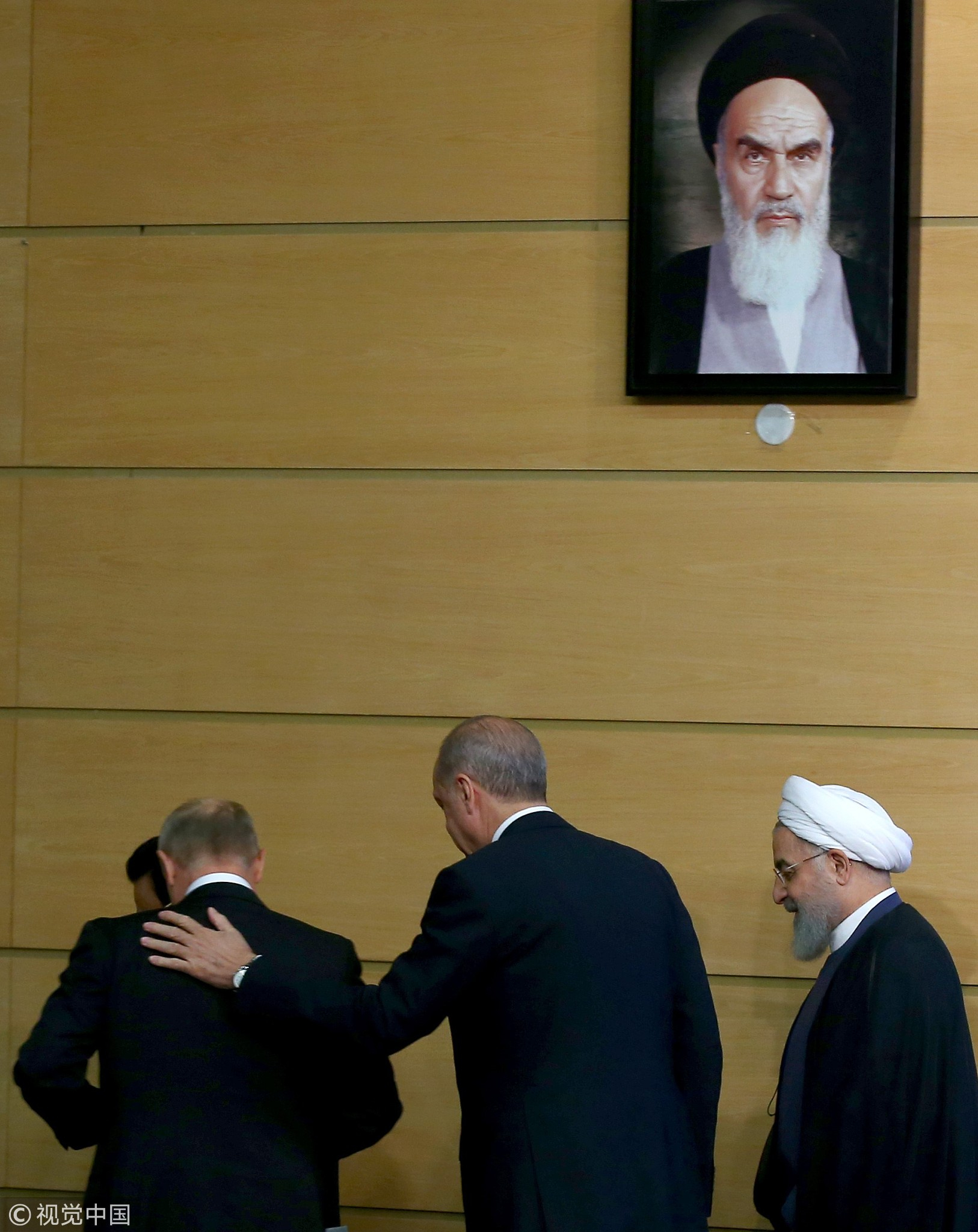
President of Turkey Recep Tayyip Erdogan (C), President of Iran Hassan Rouhani (R) and President of Russia Vladimir Putin (L) leave after the joint press conference following the trilateral summit between Turkey, Iran and Russia on Sept. 7, 2018, in Tehran, Iran. /VCG Photo
President of Turkey Recep Tayyip Erdogan (C), President of Iran Hassan Rouhani (R) and President of Russia Vladimir Putin (L) leave after the joint press conference following the trilateral summit between Turkey, Iran and Russia on Sept. 7, 2018, in Tehran, Iran. /VCG Photo
"The fight against terrorism in Idlib is an indispensable part of the mission to return peace and stability to Syria, but this fight should not harm civilians," Rouhani said.
Without participating in the meeting, the United States came in for criticism from all sides, highlighting the complex nature of a conflict involving a myriad of factions.
Rouhani said the United States should end its presence in Syria, while Erdogan said Turkey was "extremely annoyed" by Washington's support for the Syrian Kurdish YPG militia, which Ankara considers as terrorists linked to Kurdish separatists in Turkey.
Iranian Supreme Leader Ayatollah Ali Khamenei also met Putin after the summit. Khamenei said Iran and Russia can work together to restrain America.
"One of the issues that the two sides can cooperate on is restraining America," Khamenei said. "Because America is a danger for humanity and there is a possibility to restrain them."
What have they agreed on?
In the final statement, the three agreed on the need to eliminate Islamic State militants, the Nusra Front and other groups linked to al Qaeda and designated as terrorists. But there were other armed opposition groups that could join any ceasefire agreement, they said.
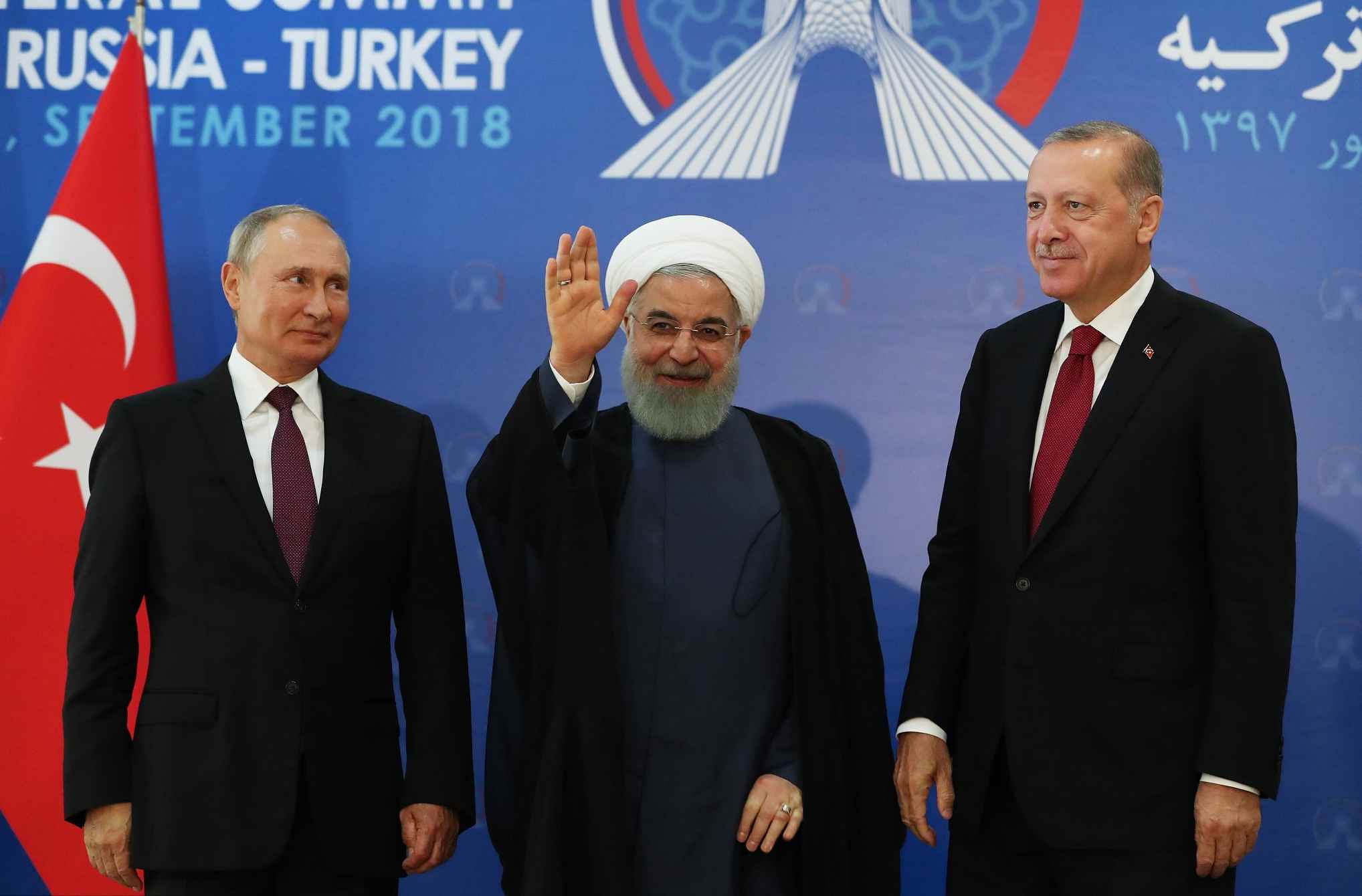
Russian President Vladimir Putin (L), Iranian President Hassan Rouhani (C) and Turkish President Tayyip Erdogan pose for a photo during the trilateral summit in Tehran on September 7, 2018. /VCG Photo
Russian President Vladimir Putin (L), Iranian President Hassan Rouhani (C) and Turkish President Tayyip Erdogan pose for a photo during the trilateral summit in Tehran on September 7, 2018. /VCG Photo
The communique also called on the United Nations and the international community to step up humanitarian aid to Syria and help in restoring basic infrastructure assets.
Efforts must be made to protect and to create conditions for the safe return of refugees, it added.
The UN
The United Nations Security Council met to discuss Idlib on Friday. The UN Syria mediator Staffan de Mistura said there were "all the ingredients for a perfect storm."
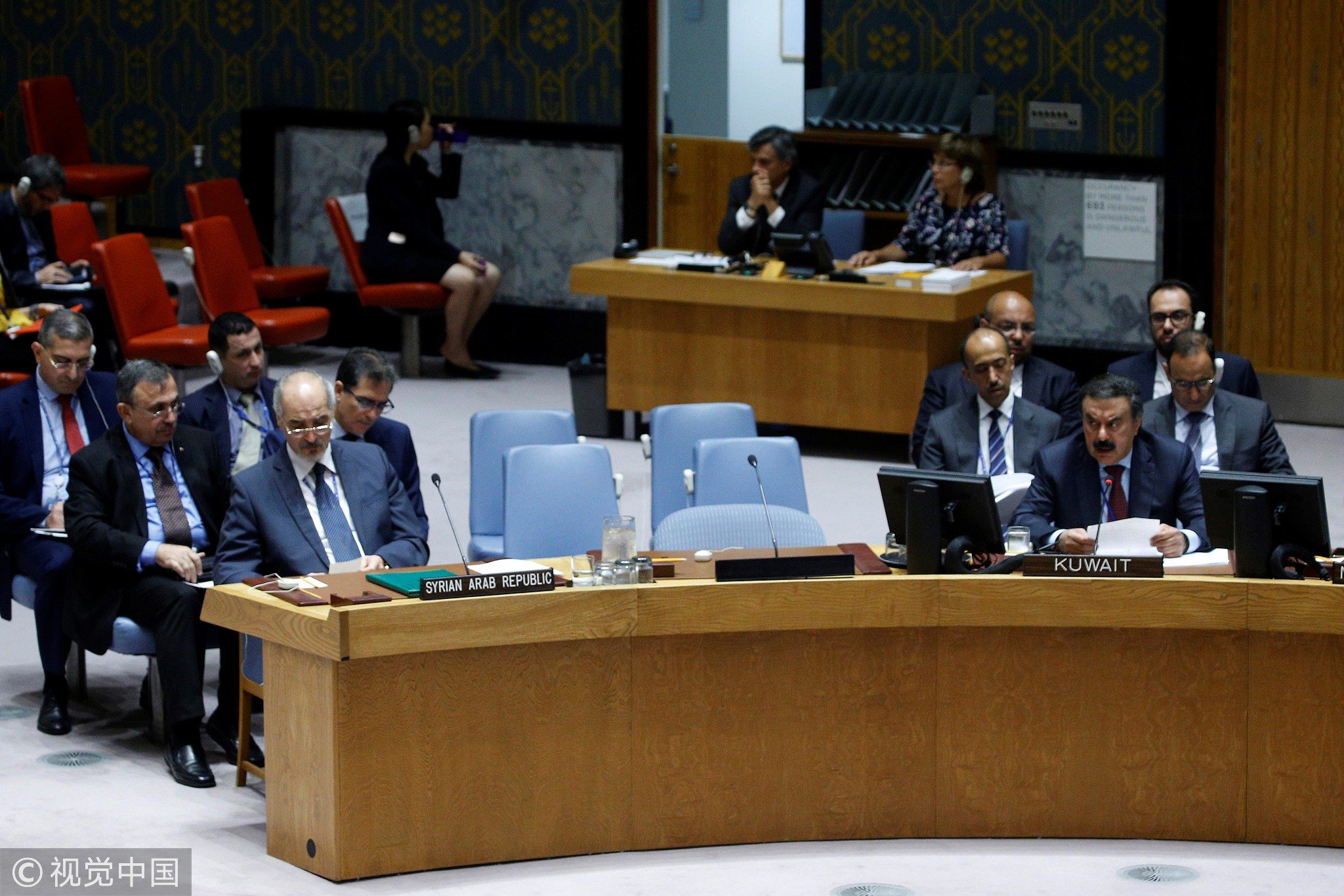
Kuwait's Deputy Foreign Minister Khaled Sulaiman Al-Jarallah (R), speaks during a UN Security Council meeting on the situation in the Middle East and Idlib, Syria at the United Nations Headquarters in New York on Sept. 7, 2018. /VCG Photo
Kuwait's Deputy Foreign Minister Khaled Sulaiman Al-Jarallah (R), speaks during a UN Security Council meeting on the situation in the Middle East and Idlib, Syria at the United Nations Headquarters in New York on Sept. 7, 2018. /VCG Photo
"The dangers are profound that any battle for Idlib could be, would be a horrific and bloody battle," de Mistura said, adding that there are ever-present dangers in the case of a full-scale assault of incidents, rapid escalations, involving regional and international players.
"The Security Council cannot accept that the civilians of Idlib must face this type of fate. Efforts to combat terrorism do not supersede obligations under international law in the moral conscience of humanity. We must put the sanctity of human civilian life above everything else."

